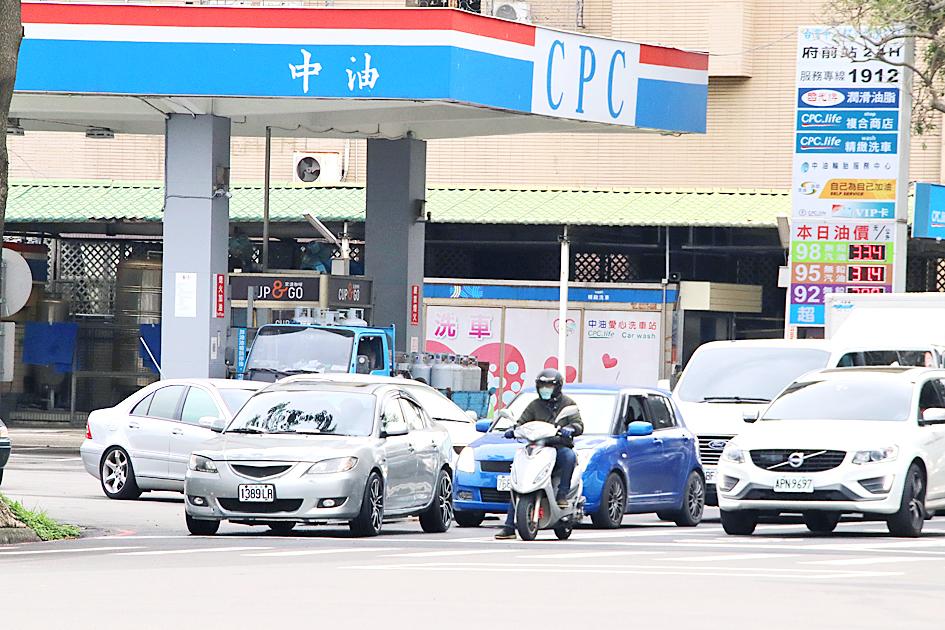State-owned oil refiner CPC Corp, Taiwan’s (CPC, 台灣中油) accumulated losses reached NT$75.1 billion (US$2.53 billion) as of the end of last month, mainly due to its absorption of international oil and gas price hikes to avoid passing the higher costs to local consumers, it said yesterday.
The losses represented more than 50 percent of the company’s paid-in capital of NT$130.1 billion and expanded from losses of NT$64.5 billion a month earlier, CPC said in a statement.
The company’s board is to meet today to discuss ways to improve its financial condition, it added.

Photo: Huang Mei-chu, Taipei Times
Global natural gas prices have skyrocketed following Russia’s invasion of Ukraine on Feb. 24, CPC said, adding that its obligation to absorb part of price hikes has been the main reason behind its increasing losses.
In the first quarter of this year, CPC spent NT$51.7 billion to absorb gas price hikes by providing subsidies, which was equivalent to about 50 percent of the NT$104.8 billion it spent for the same purpose for the whole of last year.
The company has been increasing natural gas purchases to comply with the government’s policy of reducing coal use while increasing the share of natural gas.
About 80 percent of its natural gas purchases have been used for electricity generation.
The total volume of purchases this year is expected to surpass 20 million tonnes, which could add pressure to the company’s bottom line, CPC said.
The company has been buying natural gas at a price of more than NT$20 per cubic meter, but selling it to power plants at only NT$16.75 per cubic meter, meaning it has incurred greater losses as gas consumption continues to grow in Taiwan, it said.
CPC expressed the hope that it would be allowed to raise the natural gas price to cushion the financial impact.
The company added that while international oil prices have trended lower in the past few weeks amid worries over the global economy, it would not benefit because it takes about nine weeks to refine the oil into gasoline and ship it to gas stations.
The company is still shouldering the burden from earlier high crude prices when it sold products last month and this month, CPC said.
Analysts have estimated that if the company raises its natural gas prices for electricity production, it could cut its losses by NT$4 billion.
As CPC must subsidize local natural gas sales, it incurred a loss of NT$43.4 billion last year.
Its losses from natural gas and gasoline sales totaled NT$120 billion last year, it said.
The government requires CPC to keep gasoline and natural gas prices lower than neighboring markets to decrease the financial burden on consumers.

To many, Tatu City on the outskirts of Nairobi looks like a success. The first city entirely built by a private company to be operational in east Africa, with about 25,000 people living and working there, it accounts for about two-thirds of all foreign investment in Kenya. Its low-tax status has attracted more than 100 businesses including Heineken, coffee brand Dormans, and the biggest call-center and cold-chain transport firms in the region. However, to some local politicians, Tatu City has looked more like a target for extortion. A parade of governors have demanded land worth millions of dollars in exchange

Hong Kong authorities ramped up sales of the local dollar as the greenback’s slide threatened the foreign-exchange peg. The Hong Kong Monetary Authority (HKMA) sold a record HK$60.5 billion (US$7.8 billion) of the city’s currency, according to an alert sent on its Bloomberg page yesterday in Asia, after it tested the upper end of its trading band. That added to the HK$56.1 billion of sales versus the greenback since Friday. The rapid intervention signals efforts from the city’s authorities to limit the local currency’s moves within its HK$7.75 to HK$7.85 per US dollar trading band. Heavy sales of the local dollar by

Taiwan Semiconductor Manufacturing Co’s (TSMC, 台積電) revenue jumped 48 percent last month, underscoring how electronics firms scrambled to acquire essential components before global tariffs took effect. The main chipmaker for Apple Inc and Nvidia Corp reported monthly sales of NT$349.6 billion (US$11.6 billion). That compares with the average analysts’ estimate for a 38 percent rise in second-quarter revenue. US President Donald Trump’s trade war is prompting economists to retool GDP forecasts worldwide, casting doubt over the outlook for everything from iPhone demand to computing and datacenter construction. However, TSMC — a barometer for global tech spending given its central role in the

An Indonesian animated movie is smashing regional box office records and could be set for wider success as it prepares to open beyond the Southeast Asian archipelago’s silver screens. Jumbo — a film based on the adventures of main character, Don, a large orphaned Indonesian boy facing bullying at school — last month became the highest-grossing Southeast Asian animated film, raking in more than US$8 million. Released at the end of March to coincide with the Eid holidays after the Islamic fasting month of Ramadan, the movie has hit 8 million ticket sales, the third-highest in Indonesian cinema history, Film